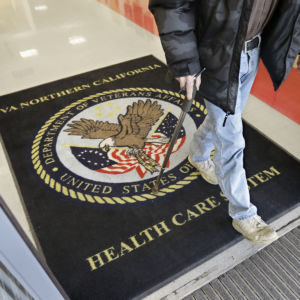Editor’s Note: For an alternative viewpoint, please see: Counterpoint: Privatization Advocates Want to Get U.S. Out of Health Business
Privatizing the Department of Veterans Affairs is an untapped opportunity for bipartisan cooperation that would advance both the Right’s goal of using market competition to improve veterans benefits and the Left’s goal of preventing troops from getting injured or killed in unnecessary wars.
Military compensation includes an implicit promise that Uncle Sam will care for veterans who became disabled or sick as a result of their service. The VA administers those benefits, including providing medical care directly to veterans through the Veterans Health Administration, a fully government-owned and operated health system.
As is typical of such systems, Congress banishes the market signals that would automatically move resources to where veterans need them. So veterans experience shortages that persist for years or even decades. The waiting list just for eligibility determinations is currently 75,000 veterans long. Some 300,000 veterans whom the VA determined to be ineligible are waiting an average 2.5 years for an appeal, long enough that thousands die waiting. Waits for medical services are so severe the Veterans Health Administration sometimes falsifies records to hide them. Some veterans die or kill themselves while waiting.
Lousy service isn’t even the worst part. Congress funds veterans benefits in a way that makes it more likely military personnel will end up getting hurt or killed in the first place. How? Veterans benefits are one of the largest financial costs of any military conflict, and those costs peak decades after a conflict ends. But Congress does not fund veterans benefits when it incurs those obligations. It only funds them when the bill becomes due, often decades later.
If Congress had to fund veterans benefits at the moment it makes those promises — i.e., when deciding how large the military should be, and (especially) when deciding whether to go to war — it would get a more accurate picture of the costs of war.
Instead, the VA serves to hide one of the largest costs of war by allowing Congress to ignore this cost of war until decades after it chooses war. Thanks to the VA, the benefits of war look relatively larger, and we get more war.
Consider that the second Bush administration estimated the Iraq war would cost $60 billion. Nobel Prize-winning economist Joseph Stiglitz and Harvard lecturer Linda Bilmes later included veterans benefits in the tally and found the cost to be closer to $3 trillion. Had the existence of VA not been helping to hide the full cost of war, Congress might have avoided one of the greatest disasters in U.S. history, or at least might have ended it sooner.
Privatization would solve both the VA’s tendencies to provide lousy service and to encourage war. It would put ownership of theVeterans Health Administration in private hands — ideally, those of veterans themselves — and would force Congress to fund veterans benefits at the moment it makes those promises.
Pre-funding veterans benefits would mean an immediate boost in military pay sufficient to allow active-duty personnel to purchase, from the private insurance company of their choice, a package of life, health and disability benefits equivalent to what the VA provides. When they leave active duty, they could use their veterans-benefits coverage at the health care providers of their choice — including a fully integrated health system owned and operated by veteran-shareholders.
Most important, making Congress fund veterans benefits at the moment it makes those promises would encourage politicians to use war only as a last resort.
President Trump and others have proposed false privatization schemes that would preserve all that is wrong with the current system. What they call “privatization” is merely having Congress pay private-sector providers to treat veterans whenever the Veterans Health Administration’s shortages become too severe. Having government write checks to private health care providers isn’t privatization — it’s Medicare.
Actual VA privatization combines the most important goals of both the free-market Right and the anti-war Left. If ever there were an opportunity for politicians to reach across the aisle to do something that all Americans support — saving the lives of U.S. service members — this is it.

